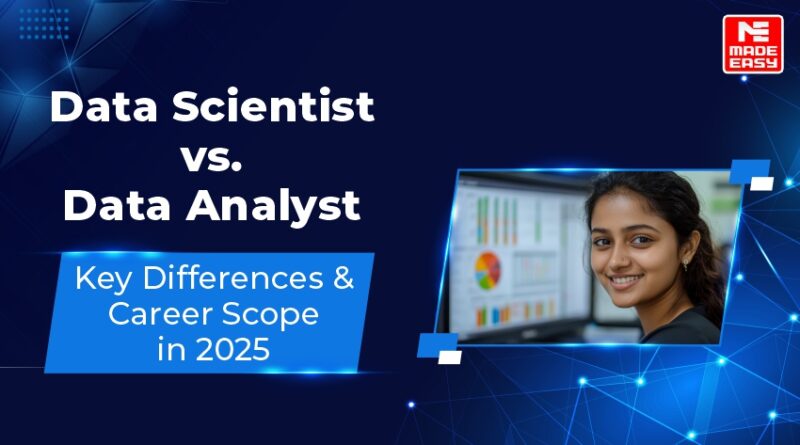Data Scientist vs. Data Analyst: Key Differences & Career Scope in 2025
With the rise in the number of internet users, there has been an exponential increase in the data volume. The demand for data has reached such an extent that now most of the organizations rely on the data to increase their customer base, enhance their marketing, strategize product development, etc. With all such huge amounts of data-driven businesses, the demand for data professionals has grown exponentially. This surge gave rise to two very popular job roles, viz., data scientist and data analyst. Often used interchangeably, the job profiles of both these roles are significantly different. In this blog, we will look at the key differences and career scope of data scientists and data analysts in 2025.
Table of Contents
Data Scientist
Till now we have seen how data analysis professionals analyze data to address the business problems. On the other hand, data scientists use more advanced skills to make predictions. Generally, data scientists work with vast structured as well as unstructured data sets, which are known as big data. They use AI, ML, predictive modeling, etc. for deep insights. . The major works of data scientists are given below:
- Data collection and its cleaning
- Data analysis
- Exploratory Data Analysis
- Model building and machine learning
- Model Evaluation and Tuning
- Data Visualization and Reporting
- Model Deployment
Essential Skills for Data Scientists
To extract valuable insights from large sets of data, the data scientist professionals require some skills. These skill sets are a mixture of programming, statistics, and domain knowledge. Although the skills upgrade with the passage of time, here we are providing some skills that are necessary to work as a data scientist.
- Programming skills: Programming languages like Python are one of the most popular languages for data science. It is used for different purposes like data cleaning, data visualisation, ML, automation, etc. Other than Python, R is used for statistical computation, and SQL is used for extracting data from databases.
- Mathematics and Statistics: Mathematics and Statistics are important for data science as they help in the understanding of algorithms like PCA, SVD, and neural networks. Also, these subjects help the data scientists in optimizing machine learning models, etc.
- Machine Learning and Deep Learning: Supervised learning helps in classification and regression tasks; unsupervised learning helps in pattern recognition and anomaly detection.
- Data Manipulation and Cleaning: Tools like Pandas and NumPy are helpful in dataframes, series, arrays, and basic data manipulation. Data cleaning is another important task of data scientists. Without proper cleaning, the desired outcome won’t be achieved even with the use of advanced models.
- Data Visualisation: Data visualisation is very important in data science as it helps in filling the gap between raw data and actionable insights.
- Communication skills: Good communication skills help data scientists to present the insights and findings to the technical and non-technical audience clearly.
Educational Qualification
Generally, a bachelor’s degree in computer science, mathematics, engineering (with exposure to programming), statistics, data science, etc. Students can also go for higher levels of education, like master’s and Ph.D. degrees. However, this is not compulsory; most of the organizations look for candidates having strong skill sets.
Industries hiring Data Scientists
Nowadays, data scientists are in huge demand in various industries for different roles depending upon their skills and problem-solving abilities. Some industries where data scientists are required in high demand are IT and technology, BFSI, e-commerce and retail, the medical industry, etc.
These are some of the industries that hire data scientists regularly, although the list is very long, but still we have tried to name a few. Those who want to know more about data scientists and the roles offered in various industries can research the same.
Master’s in Data Science
Till now we have seen a lot about data science and its industrial value. Having a master’s degree (M.Tech/M.S.) in data science from a good institute helps in boosting the resume of a candidate manyfold. Candidates can pursue M.Tech./M.S. in data science from IITs, IISc, NITs, and other top technical institutions on the basis of GATE scores. Pursuing a professional course from top institutions of India and abroad in data science would be beneficial for the aspiring data scientists.
For the ease of GATE aspirants, MADE EASY has launched courses in data science and artificial intelligence. Those candidates who are aspiring to appear in GATE 2026 in the subject of Data Science and Artificial Intelligence can visit here for more information regarding the course.
Let us now move on to data analyst.
Data Analyst
Data analysts are professionals who gather, process, and analyze various data to help organizations in making informed decisions. Data analysts mostly work with structured data to solve business problems with the help of various tools like SQL, data visualization software, and programming languages like R, Python, etc. The major works of data analysts are given below:
- Collaborating with the organization to understand the informational needs
- Data gathering and data cleaning
- Analysis of data
- Creating reports using various tools
- Providing business insights
Essential Skills for Data Analyst
To extract meaningful insights from raw information, data analysts require certain skills. These skills are essential for entry-level jobs of data analyst jobs. Some of the necessary skills are mentioned below:
- Analytical and Statistical Skills: Data analysts require strong analytical and statistical skills, as they have to deal with data, and these skills help them to understand and draw insight from the data. Statistical skill helps to ensure the validity, accuracy, and depth of the data analysis.
- Data Tools and Technologies: Data tools and technologies help in converting raw data into valuable information for a data analyst. It helps the data analysts in data gathering, data cleaning, data analyzing, data visualizing, etc. Tools like SQL, Excel, ETL, etc., help in data collection. Programming languages like R and Python help in data cleaning; tools like Power BI, Tableau, Matplotlib, etc., help in visualization.
- Programming languages: Generally, data analysts use programming languages like R, Python, etc. These programming languages help data analysts to handle large and complex datasets, and they also improve efficiency with the help of automation.
- Data Cleaning and Preparation: Data cleaning and preparation is the first step in data analysis. Generally, data analysts use various tools for data cleaning and preparation, like SQL, OpenRefine, Alteryx, and Trifacta, etc.
- Data Visualization: Data visualization helps data analysts to transform raw numbers into visual insight so that they are easy to understand, interpret, and act accordingly. Tools like SQL, Pandas, Tableau, etc., are used for data visualization.
- Communication skills: Good communication skills help data analysts to communicate with their colleagues in the organization. It also helps them to convey the information properly to other departments like marketing, finance, etc.
Educational Qualification
Generally, a bachelor’s degree in Mathematics, Statistics, Computer Science, IT, or Engineering is preferred for the role of Data Analyst. However, this is not compulsory; most of the organisations look for candidates having a strong skill set and strong foundation in subjects like Mathematics, statistics etc.
Industries hiring Data Analysts
Data Analysts are in high demand in every sector due to the role of data in businesses. Here we are listing a few industries and the roles they generally offer to data analysts.
- Banking and Finance Sectors
Roles offered: Fraud Detection, Risk analysts, investment insights etc. - E-commerce and Retail Sector
Roles offered: Customer behaviour analysis, sales optimization, sales trends etc - Marketing and Advertisement Sector
Roles offered: Campaign performance analysis, customer segmentation etc. - Manufacturing and Supply Chain sector
Roles offered: Supply chain analyst, Operation analyst, Quality control data analyst etc. - IT services
Roles offered: Data analyst, Product analyst, Operation analyst etc.
This was some of the important information about data analyst. The information given above is just a glimpse. Candidate who want to know more about the roles, skills and other things related to data analyst can research as per their need.
Which one to choose
Both data analyst and data scientist job offers great career and both are in great demand now a days. It depends upon the candidates which path they want to choose.
FAQs:
1. What is a data scientist vs data analyst?
Answer: Data Scientist Vs Data Analyst in the comparison between both job roles.
2. How to become a data scientist?
Answer: Candidates who wish to become data scientist can pursue bachelor’s or master course from top institutions of India. For a master’s course, candidate would require GATE score in Data Science and Artificial Intelligence.
3. What is data scientist?
Answer: Data Scientists are professionals who use data to make predictive models using various tools and skills.
4. What is data analyst?
Answer: Data analysts are the professionals who gather, process, and analyze various data to help organizations in making informed decisions
5. Is data analyst a good career?
Answer: Yes, Data Analyst is a good career.
6. What is data analyst job?
Answer: Data analyst collect, process and analyse data which further helps the organizations in making decisions.
Dear Aspirants,
Your preparation for GATE, ESE, PSUs, and AE/JE is now smarter than ever — thanks to the MADE EASY YouTube channel.
This is not just a channel, but a complete strategy for success, where you get toppers strategies, PYQ–GTQ discussions, current affairs updates, and important job-related information, all delivered by the country’s best teachers and industry experts.
If you also want to stay one step ahead in the race to success, subscribe to MADE EASY on YouTube and stay connected with us on social media.
MADE EASY — where preparation happens with confidence.




